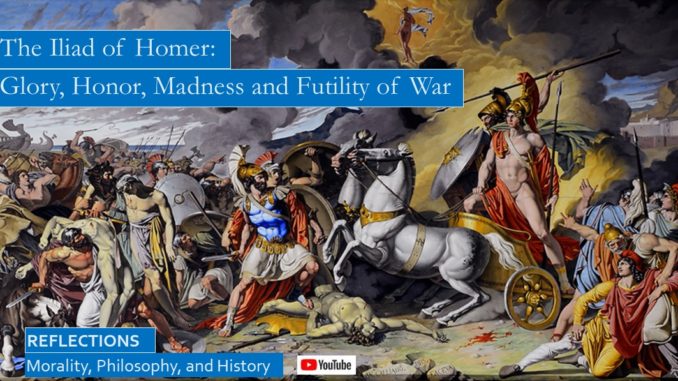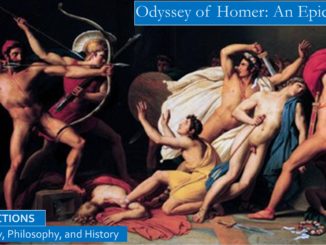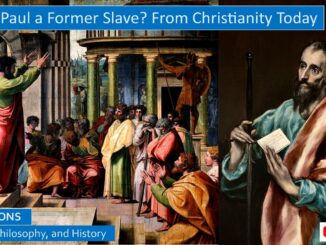
Zeus had agreed to give the Trojans their day of glory, the battle lines fall back closer and closer to the palisaded Greek camp, beyond the ditched palisades and the Greek camp lie the Greek wooden ships, moored close to the shore, floating tinderboxes. In a council of commanders the aged Nestor speaks,
“You, my illustrious King, infuriated Achilles –
you went and took from his tents the girl Briseis,
and not with any applause from us, far from it,
I for one, I urged you against it, strenuously.
But you, you gave way to your overbearing anger,
disgraced a great man the gods themselves esteem,
you seized his gift of honor and keep her still.
But even so, late as it is, let us contrive
to all this to rights, to bring him around
with gifts of friendship and warm, winning words.”[1]
REFLECTIONS ON THE ILIAD
Iliad Blog 1: Iliad, Blog 1, Why Should a Christian Read the Iliad?
http://www.seekingvirtueandwisdom.com/iliad_blog01/
The Iliad, the Basis of Greek Culture and the Western Philosophical Tradition
https://youtu.be/DpmuhZJUJn0
Iliad Blog 2, Captured Concubines in the Iliad and the Torah
http://www.seekingvirtueandwisdom.com/iliad_blog02/
The Iliad, blog 4, Briseis, Chryseis, Aren’t all Concubines the Same?
http://www.seekingvirtueandwisdom.com/the-iliad-blog-4-briseis-chryseis-arent-all-concubines-the-same/
Concubines in the Iliad, Old Testament, and Christian Tradition
https://youtu.be/bGHHD7XTvr0
Iliad, Blog 3, The Warrior Cultures of the Iliad and the American Indian, Bravely Visiting the Enemy Camp
http://www.seekingvirtueandwisdom.com/iliad-blog-3-visiting-the-enemy-camp-greeks-vs-indians/
https://youtu.be/ynIx-AVI2f8
The Iliad Blog 5, the Tide of Battle Turns Against the Greeks
http://www.seekingvirtueandwisdom.com/the-iliad-blog-5-the-tide-of-battle-turns-against-the-greeks/
The Iliad Blog 7, the deaths of Patroclus and Hector
http://www.seekingvirtueandwisdom.com/the-iliad-blog-7-the-deaths-of-patroclus-and-hector/
This video approximately corresponds to blogs 5 through 7, with some additional material:
The Iliad of Homer: Glory, Honor, Madness, and Futility of War: https://youtu.be/7lI2ZQ50wRc
YouTube script with more book links:
https://www.slideshare.net/BruceStrom1/the-iliad-of-homer-honor-glory-madness-and-futility-of-war
CONTINUING WITH THE ILIAD
As we read in the first blog, Professor Elizabeth Vandiver tells us that the “Homeric warrior fights for honor (timê, pronounced teemay) and glory or fame (kleos). Timê is often translated “honor.” However, its most basic meaning is the tangible, physical expression of honor in the form of booty, gifts, or a particular prize (geras). Kleos can be translated as “glory” or “fame.” In its most basic sense, kleos means “what other people say about you,” what is spoken aloud about you. Timê and kleos are closely related; one’s kleos depends to a large extent on the timê offered by one’s peers. But kleos also serves as the only true form of immortality available to Homeric heroes: they live on in what people say about them after they are dead.”[2]
We see timê and kleos, honor and glory, at work here, Agamemnon wants to be the top dog, he wants Achilles to be his lap dog, he wants to steal away the timê and kleos, honor and glory, away from Achilles, so all the Greek warriors know who truly is the top dog.
Agamemnon starts his speech,
“Since I was blinded, lost in my own inhuman rage,
now at last, I am bent on setting things to rights:
I’ll give a priceless ransom paid for friendship.”
This sounds like the motto of the Fortune 500 Human Resources Department,
“We are paid to be compassionate, for humans are our resources.”
The ransom offered to gain his friendship is indeed priceless,
“Seven tripods never touched by fire, ten bars of gold,
twenty burnished cauldrons, a dozen massive stallions, . . .
Seven women I’ll give him, flawless, skilled in crafts,
women of Lesbos, the ones I chose, my privilege,
the day he captured the Lesbos citadel himself,
they outclassed the tribes of women in their beauty.
These I will give, and along with them will go
the one I took away at first, Briseus’ daughter,
and I will swear a solemn, binding oath in the bargain:
I never mounted her bed, never once made love with her,
the natural thing for mankind, men and women joined.”
On and one he goes, offering “twenty Trojan women,
women second only to Argive Helen in their glory,”
He throws in his daughters into the deal, he can marry his pick,
and seven cities too, with a dowry,
his three daughters are merely named, they receive no songs of praise,
but he bard sings in his speech rich poetic pictures
of the rolling meadows and vineyards of the dowry of seven cities.
The audience surely thought, what a jerk, he spends four lines describing the seven concubines he captured as war prizes, women he doesn’t name, women he probably never spoke to as he touched them, but he only mentions his own daughters by name. We do learn the name of Briseus, father of Briseis, because he cannot even bring himself to say the name of Briseis, referring to her as Briseus’ daughter. But he thinks maybe Achilles will be swayed with the offer of yet another twenty Trojan women.
The names sound so alike, this pair of daughters and fathers,
Chryseis, daughter of Chryses, Briseis, daughter of Briseus,
Agamemnon is thinking, Chryseis, Briseis, what’s the difference?
If I steal your quarter you should be happy if you are thrown a roll in return.
How can he think otherwise, Agamemnon the mighty kind,
The noble king whose concubines fill his thoughts more than his own daughters?
The audience hearing the Iliad probably thought,
Agamemnon’s spends several lines describing how he did not touch Briseis,
Noble Briseis likely screamed, shout, clawed and dug her nails drawing blood,
Causing such a ruckus to form an un-chivalric impression
On the men in the surrounding tents, so he stopped and let her be.
But now he takes credit for his noble discretion.
The first camp meeting with Chryses, father of Chryseis, did not go well at well, Agamemnon thorough botched this camp meeting, not give Chryses a proper audience, not showing him respect, threatening his life if he did not leave, he did not show hospitality to the brave suppliant who strode alone into his enemy camp, he did not respect his bravery, he showed no empathy for his petitions.
Likewise, Agamemnon thoroughly botches the conclusion of what should have been the appeal to reconciliation with Achilles:
“All this I would extend to him if he will end his anger.
Let him submit to me! Only the god of death
is so relentless, Death submits to no one,
so mortals hate him most of all the gods.
Let Achilles bow down to me! I am the greater king,
I am the elder-born, I claim to be the better man.”
To be top dog, to be seen as top dog, for Achilles to bow down like a supplicant,
though he be a mighty prince and warrior, that is all Agamemnon cares about.
The Greek audience would notice, Agamemnon botches the speech,
the speech to reconcile himself with Achilles,
and the meeting to reconcile with Achilles is botched,
This meeting at the camp of Achilles is doomed before it begins.
Three Greeks are carefully chosen, chosen all the more carefully
because the Greek who should attend, Agamemnon, stays behind,
too important in his own mind to condescend to attend,
although he is not a supreme sovereign, but merely a prince among princes,
chosen by his fellow princes to be sovereign only for the duration of the war.
The meeting goes off according to form,
they find Achilles by the shore, not preparing for battle,
but rather strumming a lyre, playing the part of the bard,
singing praises to the valor and courage of warriors in battle.
Welcoming his visitors, Achilles plays the role of the perfect host,
the bard sings how Patroclus kills and grills a sheep and a goat and a boar,
and Achilles serves the meet to his guests as Patroclus serves the bread,
as Odysseus fills a cup and offers a toast to the noble Achilles.
But the main suppliant is missing, who says he wishes friendship,
the main suppliant who, if he were truly a friend,
would have brought the beautiful Briseis with him,
extolling the beauty and virtue of the noble Briseis for many lines,
returning the beautiful Briseis to noble Achilles, no strings attached.
He had no need to apologize, he had no need to hug the knees of Achilles,
All he needed to do was admit his hubris and his lust in seizing Briseis,
and praising for many lines the timê and kleos, honor and glory of mighty Achilles,
brave in battle, noble in spirit, virtuous in character. But this he would never do.[3]
Later, after strumming the lyre while many battle had been fought,
as he straps his armor on his kind friend Patroclus,
who volunteers to fight in his stead, Achilles laments,
Oh the Trojans would have “run for their lives
and choke the torrent-beds of the field with all their corpses
if only the mighty Agamemnon met me with respect.”[4]
After his toast, the wily Odysseus, spinner of tales, in perfect rhetorical flourish,
Odysseus, the first of the three embassies to Achilles, speaks first:
“We are afraid, all hangs in the balance how,
whether we save our beached ships or they are destroyed,
unless, of course, you put your fighting power in harness . . .
Hector prays for the sacred Dawn to break at once,
he threatens to lop the high horns of our sterns
and gut our ships with fire, and all our comrades
pinned against the hulls, panicked by thick smoke,
he’ll rout and kill in blood!”
Odysseus eloquently launches into the appeal he was bade to bring,
nearly word for word, purposely not changing any of the wording,
as Agamemnon instructed, Briseis’ name is not mentioned,
she is referred to as the daughter of Briseus,
followed by the twenty Trojan women.
Odysseus knows this ransom will not win over the heart of Achilles, so he adds,
“If you hate the son of Atreus all the more,
him and his troves of gifts, at least take pity
on all our united forces mauled in battle here,
they will honor you, honor you like a god.
Think of the glory you will gather in their eyes!”
Professor Vandiver launches into a wonderful lecture on how Achille’s answer truly breaks convention, his answer challenges the very foundations of the Greek warrior ethos. Achilles answers,
“Royal son of Laertes, Odysseus, great tactician,
I must say what I have to say straight out,
I must tell you how I feel and how this will all end:”
So we learn that men truly have feelings!
“What will be our lasting thanks in the long run
for warring with our enemies, on and on, no end?
One and the same lot for the man who hangs back
and the man who battles hard. The same honor waits
for the coward and the brave. The both go down to Death,
the fighter who shirks, the one who fights to exhaustion.”
Further along in his speech Achilles proclaims,
“I loved that woman with all my heart,
though I won her like a trophy with my spear,
but now that he has torn my honor from my hands,
robbed me, lied to me, don’t let him try me now.
I know him too well, he will never win me over!”
Some verses truly shocking to ancient Greeks follow, “Mother tells me,
the immortal goddess Thetis with her glistening feet,
that two fates bear me on to the day of death.
If I hold out here and I lay siege to Troy,
my journey home is gone, but my glory never dies.
If I voyage back to the fatherland I love, my pride, my glory dies,
true, but the life that is left me will be long,
the stroke of death will not come on me quickly.”
Professor Vandiver comments that it is rare for mortals in these tales to know their fate, and it is unheard of that they would be revealed a dual fate. Achilles is tempted sorely to board he and his people on his ships and sail back to Greece; but alas, he would have to leave Briseis behind, and that he cannot do.
Another implication is even if Achilles returns to battle he will soon die, so the ransom means nothing to him because he can never enjoy the booty, neither in life, for he knows that what have been given can be taken away, nor in death.
Then Phoenix, the old charioteer, the second embassy, chosen because he helped raise Achilles as a child, who bounced the toddler Achilles on his knees, offers a heart-felt pleading. He starts with a morally horrible story about how came to be at the court of his father Peleus, with whom Achilles has an ambiguous relationship, and he has some heart-tugging spitting up on his shirt stories, but his pleas end badly with a story running for pages about how this old warrior was offered a hefty ransom, and how he waited too late and lost his ransom.
Achilles dismisses him, addressing Phoenix, his foster father,
“Stop this weeping and wailing, just to serve his pleasure, Atreus’ might son.
It degrades you to curry favor with that man,
and I will hate you for it, I who love you.”
The last of the embassies, the mighty warrior Ajax, does speaks for pages and pages like the embassies preceding, but like Lincoln, following hours of long winded and long forgotten rhetorical flourishes, delivers a succinct speech of but a few paragraphs that reaches the heart of Achilles,
“Achilles, put some human kindness in your heart.
Show respect for your own house. Here we are,
under your roof, sent from the whole Achaean force!
Past all other men, all other Achaean comrades,
we long to be your closest, dearest friends.” [5]
Kindess, respect, friendship, these are truly the noblest of manly virtues.
Respect, kindness, love, these are also Christian virtues. We are to show respect for God, putting no other gods before Him, we are to respect His Word, and worship Him, we are to honor our parents, respecting them and our neighbors, showing them kindness, no murdering them, not harming them, not stealing from them, not adultering them, not envying them, showing respect and kindness to all so we may truly Love God, and love our neighbor as ourselves. “No one has greater love than this, to lay down one’s life for one’s friends.”[6]
This last plea touches the heart of Achilles, he pledges he will not set sail for Greece, but will put on his armor once again when the Trojan hordes threaten to set fire to his Greek ships on the coast of his camp.
Iliad Blog 7 http://www.seekingvirtueandwisdom.com/the-iliad-blog-7-the-deaths-of-patroclus-and-hector/
[1] Homer, “The Iliad,” translated by Robert Fagles (New York: Penguin Books, 1990), Book 9, pp. 254-256.
[2] Elizabeth Vandiver, “The Iliad of Homer,” lectures recorded by The Great Courses, (www.thegreatcourses.com, 1999), lectures 2-3, quotations are from the study guide.
[3] Homer, “The Iliad,” Book 9, pp. 254-256
[4] Homer, “The Iliad,” Book 16, p. 414
[5] Homer, “The Iliad,” Book 9, pp. 257-275.
[6] https://www.biblegateway.com/passage/?search=John+15%3A13&version=NRSVCE, John 15:13



10 Trackbacks / Pingbacks